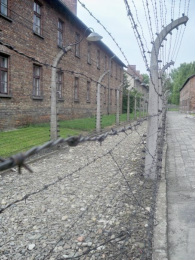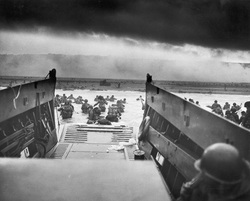
This weekend I was doing the normal Sunday afternoon thing where I catch up on all the latest news, updates from friends on Facebook, and seeing what the people at reddit were talking about. I came across an interesting news article on my news binge about an apartment in Paris that had been left abandon for 70 years. The owner was an upper class Parisian in her mid-twenties. When it looked like the Germans were going to successfully invade Paris, she fled for the south. She continued to pay rent on the apartment, even after the war though she did not return to live there. She continued to pay rent on the apartment until she passed away at 91 years young. That is how her time capsule apartment was discovered.

Then this morning I was on CNN and found an article about a Polish photographer who goes around (mostly in Poland), finding abandoned or unused historical buildings and photographs them.

This made me think about when I visited Auschwitz a few summers ago on a research trip. We walked around the camp, where several million had walked. The buildings were in tip top condition, and the chill you received when you entered most of the buildings, and heard the stories of what took place there was as daunting as if you had been there during the years that Auschwitz was a mass murder site and not a museum detailing the atrocities. In my field of study I have had the opportunity to visit several of the notorious camps that Hitler opened in order to create his master race. Most still had most of their original buildings. A lot of important sites throughout Europe, not just from World War II, but from history tend to have the original buildings, or a least part of the building, still standing.
When you "cross the pond" and head to the United States in search of authentic historic landmarks, it seems that as the years go by it is harder and harder to find. There are places across the United States that bank on the historic value of their towns (Boston, New York, Washington D.C., and Williamsburg to name a few). However, it seems that many historical buildings and historical areas have been torn down over the years with no record of what once stood there.
This rings true to Camp Algona. It was built in 1944 and by 1946 had been torn down and basically sold for parts. The researcher in me asks: Why? It is terribly sad when you read about another victorian house or historic drug store that had been around for a century being torn down, but why tear down things that represent our history? As the United States, are we embarrassed by that chapter of our history? It is understandable where we, as Americans, may be embarrassed and horrified by the way previous generations treated the Native Americans, those who participated in the Civil Rights Movement, or even the Japanese-Americans during World War II.
If the German people feel it is important to keep the history and the message of what happened at places like Auschwitz alive to prevent such a thing from potentially happening again, why not keep places like Camp Algona alive to represent not only it's small role in our Nation's history, but also to represent that even in times of war, humanity is not lost. That you can treat your enemy with respect, because in actuality, that is what occurred at Camp Algona from 1944-1946. Two sides who were told to hate each other, without really knowing the other, were brought together under unusual circumstances. My Grandma used to say hospitality and respect went a long way, and it really did. The German prisoners at Camp Algona were met with respect, those working on local farms formed friendships, some that would last the rest of their lives, and when the war ended the Americans and Germans went their separate ways. There was no animosity towards treatment of the German POWs, and many continued correspondence with Lt. Col Lobdell for many years after the war.
So what am I getting at? Why can we not do what the Europeans do and respect the historical places? It makes for a more memorable visit when you can see it opposed to reading a plaque that had been placed in memorial. Though, I will say (and perhaps I am biased), if Camp Algona cannot physically be here, the museum does an excellent job still telling it's story.
Time to hop off my historian soapbox!
For more information on the abandoned Parisian Apartment Click Here
For more information on the abandoned Polish landmarks Click Here
This rings true to Camp Algona. It was built in 1944 and by 1946 had been torn down and basically sold for parts. The researcher in me asks: Why? It is terribly sad when you read about another victorian house or historic drug store that had been around for a century being torn down, but why tear down things that represent our history? As the United States, are we embarrassed by that chapter of our history? It is understandable where we, as Americans, may be embarrassed and horrified by the way previous generations treated the Native Americans, those who participated in the Civil Rights Movement, or even the Japanese-Americans during World War II.
If the German people feel it is important to keep the history and the message of what happened at places like Auschwitz alive to prevent such a thing from potentially happening again, why not keep places like Camp Algona alive to represent not only it's small role in our Nation's history, but also to represent that even in times of war, humanity is not lost. That you can treat your enemy with respect, because in actuality, that is what occurred at Camp Algona from 1944-1946. Two sides who were told to hate each other, without really knowing the other, were brought together under unusual circumstances. My Grandma used to say hospitality and respect went a long way, and it really did. The German prisoners at Camp Algona were met with respect, those working on local farms formed friendships, some that would last the rest of their lives, and when the war ended the Americans and Germans went their separate ways. There was no animosity towards treatment of the German POWs, and many continued correspondence with Lt. Col Lobdell for many years after the war.
So what am I getting at? Why can we not do what the Europeans do and respect the historical places? It makes for a more memorable visit when you can see it opposed to reading a plaque that had been placed in memorial. Though, I will say (and perhaps I am biased), if Camp Algona cannot physically be here, the museum does an excellent job still telling it's story.
Time to hop off my historian soapbox!
For more information on the abandoned Parisian Apartment Click Here
For more information on the abandoned Polish landmarks Click Here


 RSS Feed
RSS Feed
